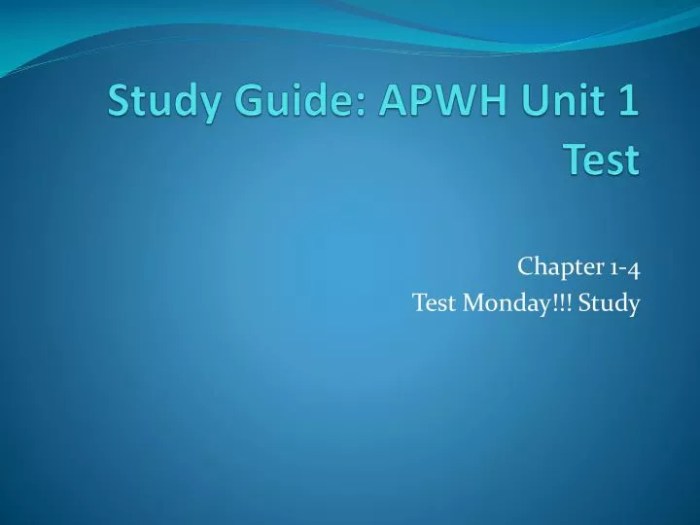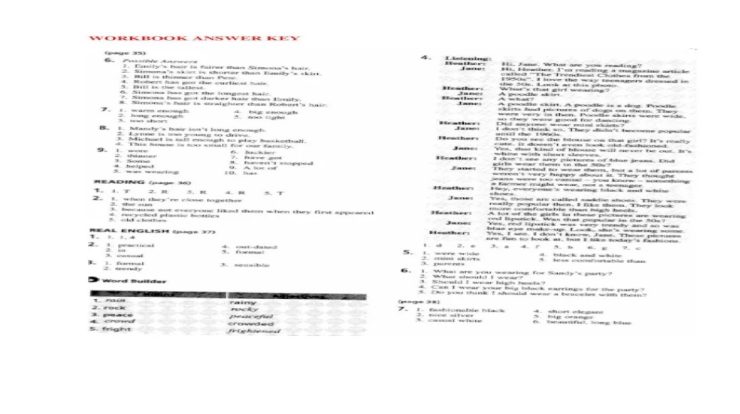Embark on a historical journey with our APWH Unit 1 Practice Test, meticulously designed to equip you with the knowledge and skills necessary to excel in the actual exam. This comprehensive guide delves into the intricacies of the test format, historical content, question types, and effective test-taking strategies, empowering you to conquer the challenges that lie ahead.
As you navigate through this practice test, you will encounter a diverse range of historical periods, each brimming with pivotal events, concepts, and themes that have shaped the course of human civilization. From the ancient world to the dawn of modern history, you will gain a deep understanding of the forces that have driven societal change and the complexities of human interactions.
Practice Test Overview
The APWH Unit 1 practice test is a valuable resource for students preparing for the Advanced Placement World History exam. This test provides a comprehensive review of the key concepts and themes covered in Unit 1 of the APWH curriculum, including the Neolithic Revolution, the development of early civilizations, and the rise of empires.
The practice test is structured similarly to the actual APWH exam, consisting of two sections: a multiple-choice section and a free-response section. The multiple-choice section includes 55 questions, each worth one point. The free-response section includes three essay questions, each worth six points.
Test Format, Apwh unit 1 practice test
The multiple-choice section of the practice test covers a wide range of topics from Unit 1. Questions are divided into three categories: knowledge, comprehension, and application. Knowledge questions test students’ basic understanding of key concepts and terms. Comprehension questions require students to analyze and interpret historical information.
Application questions ask students to apply their knowledge of history to new situations.
The free-response section of the practice test requires students to demonstrate their ability to write clear, concise, and well-supported essays. Essay questions typically ask students to analyze a historical event or development, or to compare and contrast different historical perspectives.
Time Limits
The practice test is timed, with 55 minutes allotted for the multiple-choice section and 75 minutes for the free-response section. This time limit is designed to simulate the actual APWH exam, which is also timed.
Historical Periods and Content Coverage: Apwh Unit 1 Practice Test

The practice test encompasses three distinct historical periods, each characterized by unique events, concepts, and themes.
The first period, spanning from the Neolithic Revolution to the Classical Era, witnesses the emergence of agriculture, the rise of civilizations, and the development of early writing systems. Key events include the domestication of plants and animals, the invention of the wheel, and the establishment of urban centers.
Neolithic Revolution
- Transition from hunting and gathering to agriculture
- Domestication of plants and animals
- Emergence of settled communities
Bronze Age
- Development of bronze metallurgy
- Rise of centralized societies
li>Expansion of trade and cultural exchange
Classical Era
- Emergence of Greece and Rome
- Development of philosophy, science, and literature
- Expansion of empires and political systems
Question Types and Analysis
The practice test features a variety of question types designed to assess your historical knowledge and analytical skills.
Each question type requires a specific approach and demonstrates your mastery of different cognitive skills. Understanding the nuances of each type will help you optimize your preparation and performance.
Multiple-Choice Questions
Multiple-choice questions present you with a stem and several options. Choose the option that best answers the question or completes the statement.
These questions test your ability to recall specific facts, identify cause-and-effect relationships, and make inferences.
Example: Which of the following was a major factor contributing to the American Revolution?
- British economic policies
- French military support
- Native American alliances
- Spanish territorial expansion
Short-Answer Questions
Short-answer questions require you to provide a brief, concise answer to a specific historical question.
These questions assess your ability to recall information, organize your thoughts, and communicate your understanding clearly.
Example: Describe the role of slavery in the economic development of the American South.
The APWH Unit 1 practice test is a great way to assess your understanding of the material. If you’re looking for more practice, you can also check out the Accounting 200 UTK Exam 1 . This exam covers similar topics and can help you identify areas where you need additional study.
After reviewing the Accounting 200 UTK Exam 1, be sure to come back and complete the APWH Unit 1 practice test to solidify your understanding.
Document-Based Questions
Document-based questions provide you with a historical document or set of documents and ask you to analyze and interpret them.
These questions test your ability to read and comprehend historical sources, extract relevant information, and synthesize evidence to support a historical argument.
Example: Analyze the following letter written by George Washington to his troops at Valley Forge and discuss its significance in understanding the challenges faced by the Continental Army.
Essay Questions
Essay questions ask you to develop a well-organized and supported response to a historical topic.
These questions assess your ability to synthesize information, construct a coherent argument, and communicate your historical understanding in a clear and concise manner.
Example: Discuss the causes and consequences of the French Revolution and its impact on the development of democracy in Europe.
Test-Taking Strategies and Time Management
Effective test-taking strategies and time management are crucial for maximizing performance on any practice test. Here are some strategies to help you make the most of your time and improve your score:
Prioritize Questions
Not all questions are created equal. Prioritize the questions you answer based on their difficulty and point value. Start with the easier questions first to build confidence and save time for the more challenging ones.
Manage Your Time
Allocate a specific amount of time to each section or question. Stick to your time limits to avoid spending too much time on any one question. Use a watch or timer to keep track of your progress.
Pace Yourself
Pace yourself throughout the test to avoid feeling rushed or overwhelmed. Take short breaks as needed to clear your head and refocus.
Guess Strategically
If you’re unsure of the answer to a question, make an educated guess. Eliminate any options you know are incorrect and choose the best option from the remaining choices.
Review Your Answers
If time permits, review your answers before submitting the test. Look for any inconsistencies or errors that you may have missed initially.
Practice Questions and Answer Explanations

Practice questions are essential for honing your understanding of historical content and preparing for the AP World History Unit 1 test. The following table presents a selection of practice questions, covering various historical periods and question types, along with detailed answer explanations.
Each question is categorized according to its historical period and question type. The answer explanations provide a comprehensive rationale for the correct answer, highlighting key concepts and historical evidence.
Practice Questions
| Historical Period | Question Type | Question | Correct Answer | Explanation |
|---|---|---|---|---|
| Paleolithic Era | Multiple Choice | Which of the following is a characteristic of Paleolithic societies? | A. Sedentary lifestyleB. Nomadic lifestyleC. Advanced technologyD. Extensive agriculture | B. Nomadic lifestylePaleolithic societies were primarily nomadic, relying on hunting and gathering for sustenance. |
| Ancient Egypt | Short Answer | Describe the significance of the Nile River to the development of ancient Egyptian civilization. | The Nile River was the lifeblood of ancient Egypt.It provided water for irrigation, transportation, and trade, and its fertile soil allowed for the development of agriculture and a stable society. | |
| Classical Greece | Document-Based Question | Analyze the following passage from the Athenian statesman Pericles: “Our constitution does not copy the laws of our neighbors; rather, we are a model to others.” What does this passage reveal about Athenian attitudes towards other Greek city-states? | Athenians believed their constitution was superior to that of other Greek city-states.They saw themselves as a model for others to emulate, demonstrating their confidence and sense of superiority. | |
| Medieval Europe | Essay | Discuss the impact of the Black Death on European society. | The Black Death had a devastating impact on European society.It caused widespread death and social upheaval, leading to labor shortages, economic decline, and religious and social unrest. | |
| Early Modern World | Multiple Choice | Which of the following was a major cause of the Age of Exploration? | A. Religious zealB. Scientific curiosityC. Economic motivesD. All of the above | D. All of the aboveReligious zeal, scientific curiosity, and economic motives were all significant factors driving the Age of Exploration. |
Scoring and Interpretation
The practice test is scored based on the number of correct answers you provide. Each question is worth one point, and the total possible score is 50 points.
To interpret your test results, compare your score to the following benchmarks:
Scoring Benchmarks
- 40-50 points:Excellent understanding of the content and strong preparation for the actual APWH exam.
- 30-39 points:Good understanding of the content but may need to review specific areas.
- 20-29 points:Basic understanding of the content and need significant review and improvement.
- Below 20 points:Need to significantly review the entire content and consider additional support.
Use the practice test to identify areas where you need to improve. Review the questions you missed and consult your textbooks, notes, or other resources to reinforce your understanding of those concepts.
The practice test is an invaluable tool to help you prepare for the actual APWH exam. By taking the practice test, you can identify your strengths and weaknesses, focus your studies, and increase your confidence on test day.
Quick FAQs
What is the purpose of the APWH Unit 1 Practice Test?
The APWH Unit 1 Practice Test provides students with an opportunity to assess their knowledge of the historical content covered in Unit 1 of the AP World History course and to practice their test-taking skills.
What historical periods are covered in the APWH Unit 1 Practice Test?
The APWH Unit 1 Practice Test covers the following historical periods:
- Prehistory
- The Ancient World
- The Middle Ages
- The Renaissance and Reformation
- The Age of Exploration
What types of questions are on the APWH Unit 1 Practice Test?
The APWH Unit 1 Practice Test includes a variety of question types, including multiple choice, short answer, and document-based questions.
How can I use the APWH Unit 1 Practice Test to prepare for the actual exam?
You can use the APWH Unit 1 Practice Test to prepare for the actual exam by:
- Identifying areas where you need additional study
- Practicing your test-taking skills
- Building your confidence
